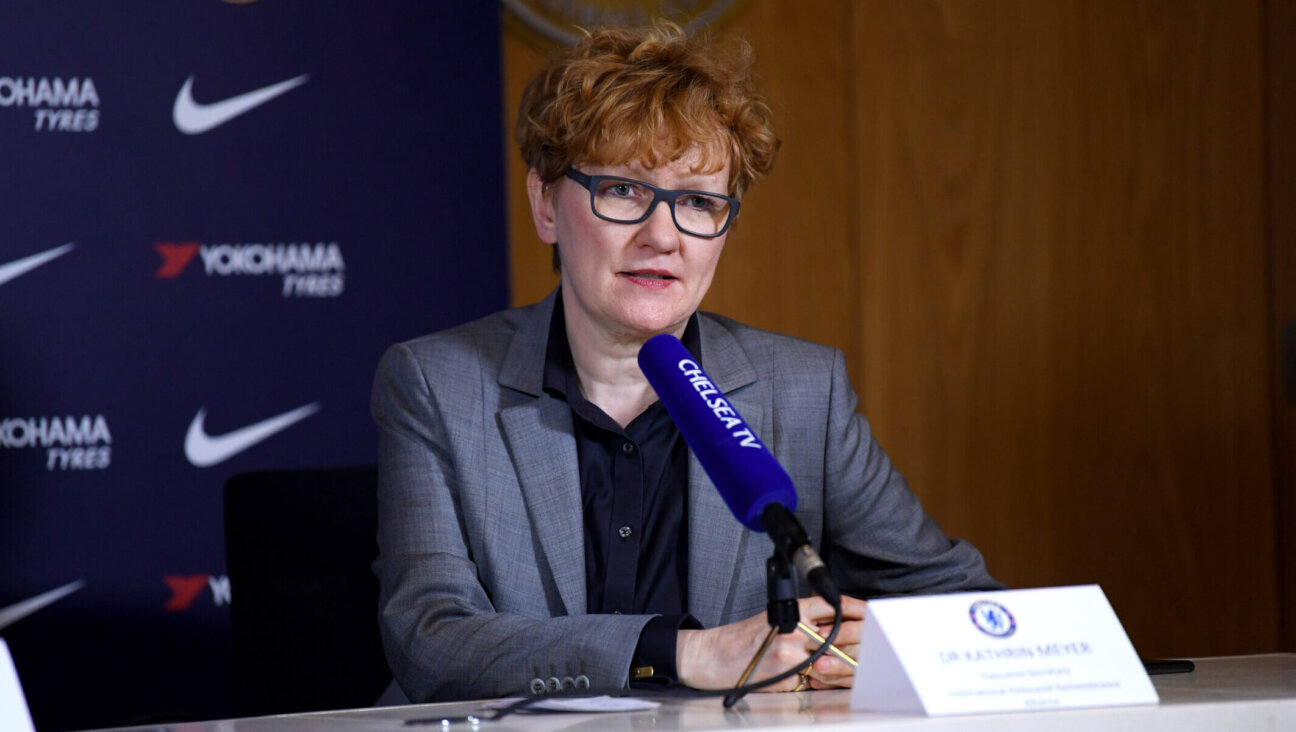In a Jerusalem Praying for Unity, Sectarianism Widens the Divide
The acting mayor of Jerusalem, Uri Lupolianski, was “busy” last Friday. That morning a delegation from the Board of Governors of Hebrew Union College-Jewish Institute of Religion — headed by Chairman Burton Lehman, and including former chairmen Richard Scheuer and Stanley Gold — was scheduled to meet with Mayor Lupolianski at his office in City Hall. On Thursday night, however, while the American ambassador to Israel, Daniel Kurtzer, hosted our delegation at the American ambassadorial residence in Herzliya, we received a phone call stating that the mayor was unavailable and that no alternative time for a meeting could be arranged.
The meeting itself was meant to be a ceremonial occasion. The purpose was to greet the new mayor and express the solidarity that HUC feels with the people of Israel at this moment in history. Such meetings with the mayor are routine parts of Board of Governors trips to Jerusalem. As president of HUC, I met several times with former mayor Ehud Olmert during the last two years. He himself came twice during this period to the Jerusalem campus of HUC to offer greetings and support to our more than 100 North American Reform rabbinical, cantorial and education students who have come to study in Jerusalem during these days of tribulation for the Jewish people.
As a historian of Orthodox Judaism in the modern world, I was and am well aware that the attitudes of ultra-Orthodox Jews toward non-Orthodox expressions of religious Judaism have been unfailingly hostile. On the other hand, I have long been familiar with the legendary charitable deeds that Mayor Lupolianski has performed through his Yad Sarah Foundation, and a number of my Jerusalem friends who are acquainted with the mayor have assured me that he is a man of extraordinary kindness and concern.
Mayor Lupolianski had also rightly pledged from his first moment in office to be the mayor of all the people. I regarded his decision to set aside his own undoubted personal antipathy toward Reform Judaism and meet with our delegation as an appropriate act for the leader of the eternal capital of the Jewish people.
Such willingness on his part displayed a sensitive understanding of the symbolic role his office plays and demonstrated his recognition that the importance of Jewish unity at this moment of trial for the State of Israel should properly be given priority over any religious differences that divide our people. Such an expression of love for the totality of the Jewish people was exemplary.
The subsequent failure of Mayor Lupolianski to meet with our Board of Governors was therefore extremely disappointing, and I could not help but reflect upon other events in modern Jewish history when the fruits of an uncalled-for sectarianism led to needless damage and hurt for the Jewish people.
In 1872, a delegation of German Jews headed by the prominent historian Heinrich Grätz came to the land of Israel. Grätz taught at the Positive-Historical (Conservative) Jewish Theological Seminary in Breslau, and was routinely condemned as a heretic by the Orthodox rabbis of his day because of his historical research work. Grätz and his party discovered that there was no Jewish orphanage then extant in Jerusalem, and they observed that Christian missionaries routinely gathered up Jewish orphans on the streets of Jerusalem and raised them in Christian orphanages.
Grätz and his delegation decided to remedy this situation by establishing a Jewish orphanage in Jerusalem that would provide for the care and education of these youngsters. A secular course of study was proposed for this orphanage, and vocational training was to be offered so that these Jewish children would one day be self-sufficient.
The rabbis of Jerusalem were completely opposed to the establishment of such an orphanage, claiming that the proposed curriculum would pollute the holy city. They further asserted that a “heretic” like Grätz was not to be trusted.
When Grätz and his party returned to Germany and sought funds for the creation of this institution, the Orthodox opposition continued. The famed rabbi Samson Raphael Hirsch — the great champion of a form of Orthodox Judaism, so-called Torah ‘im Derekh Eretz, that combined adherence to rabbinic law with the promotion of secular studies — opposed the creation of this orphanage on the grounds “that it was the idea of Grätz.” In the end, the funds for the creation of this Jewish orphanage were not raised and the children remained open prey for Christian missionaries.
Similarly, during the 1930s there was a proposal to move the Modern Orthodox Hildesheimer Seminary from Berlin to British Mandate Palestine. In this German Orthodox Rabbinerseminar, rabbis were required to receive a doctoral degree from a recognized German university, in addition to their traditional rabbinic studies. The rabbis of the land of Israel were hostile to this new type of Orthodox rabbi, and they therefore opposed the establishment of an institution that would educate such rabbis in the Holy Land.
In tones reminiscent of the earlier incident, one great ultra-Orthodox authority labeled the Hildesheimer Seminary “a rabbi-factory.” Other charedi spokesmen contended that Modern Orthodox rabbis possessed of secular education would desecrate the Holy Land. These rabbis succeeded in preventing the Hildesheimer Seminary from being relocated to Palestine, and with the outbreak of World War II this bastion of Modern Orthodox Judaism was completely destroyed by the Nazis. The destruction of the Rabbinerseminar — in light of the opportunity that was presented for its transfer — stands as one of the saddest and most shameful moments in modern Jewish history.
I hardly believe that the inability of Mayor Lupolianski to meet with our delegation will rise to the level of the incidents involving Grätz and the Hildesheimer Seminary. But there is a common thread of misplaced sectarian sensibility that runs through all these occurrences and his failure is — at the very least — most regrettable. In saying this, I am not commenting on the personal beliefs of the mayor. He has every right as an individual to feel that Reform Judaism is wrong. However, the mayor sadly squandered a wonderful opportunity to display genuine leadership. He should have employed this moment to demonstrate his recognition that all Jews share, in the words of the late Rabbi Joseph Soloveitchik, in a “brit hagoral,” a covenant of common destiny that marks us as one people who share a common fate as well as mutual responsibility for one another.
The members of the HUC Board of Governors delegation grasped these truths, and that is why they chose to stand with and in Israel at this hour. It is heart-rending that the mayor could not set sectarian politics aside and find 15 minutes to meet with such men and women. Had he done so, he could have demonstrated to the world that the reality of Jewish kinship takes precedence over whatever religious differences separate us. For this act of refusal, Mayor Lupolianski must take responsibility. This “non-meeting” radiates an aura of exclusion that ill serves our people.
The Talmud tells us in Tractate Gittin that Jerusalem was once destroyed on account of the sin of sinat chinam, or groundless enmity. Our people should not fall victim to this transgression today.
A message from our Publisher & CEO Rachel Fishman Feddersen

I hope you appreciated this article. Before you go, I’d like to ask you to please support the Forward’s award-winning, nonprofit journalism so that we can be prepared for whatever news 2025 brings.
At a time when other newsrooms are closing or cutting back, the Forward has removed its paywall and invested additional resources to report on the ground from Israel and around the U.S. on the impact of the war, rising antisemitism and polarized discourse.
Readers like you make it all possible. Support our work by becoming a Forward Member and connect with our journalism and your community.
— Rachel Fishman Feddersen, Publisher and CEO























